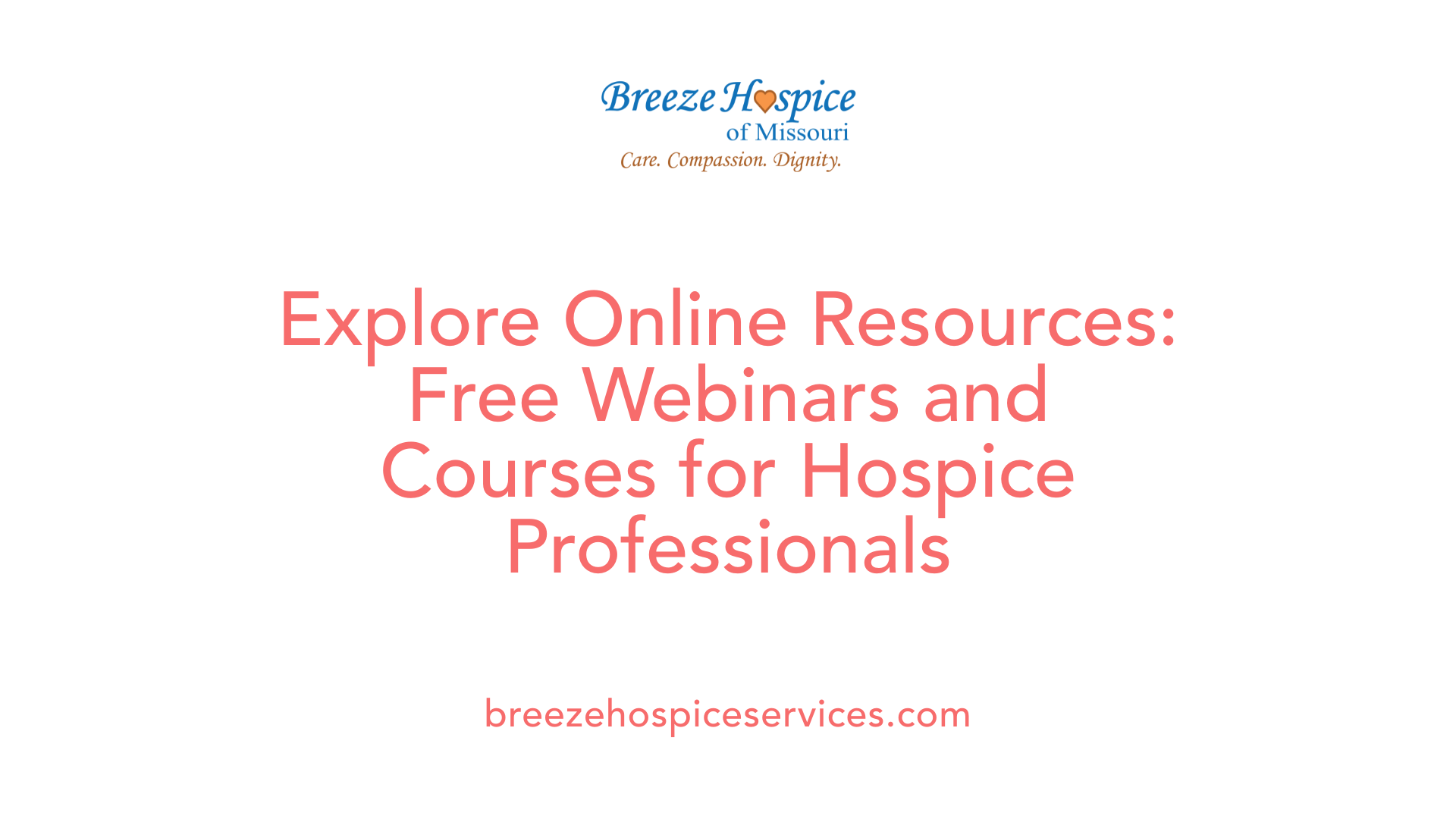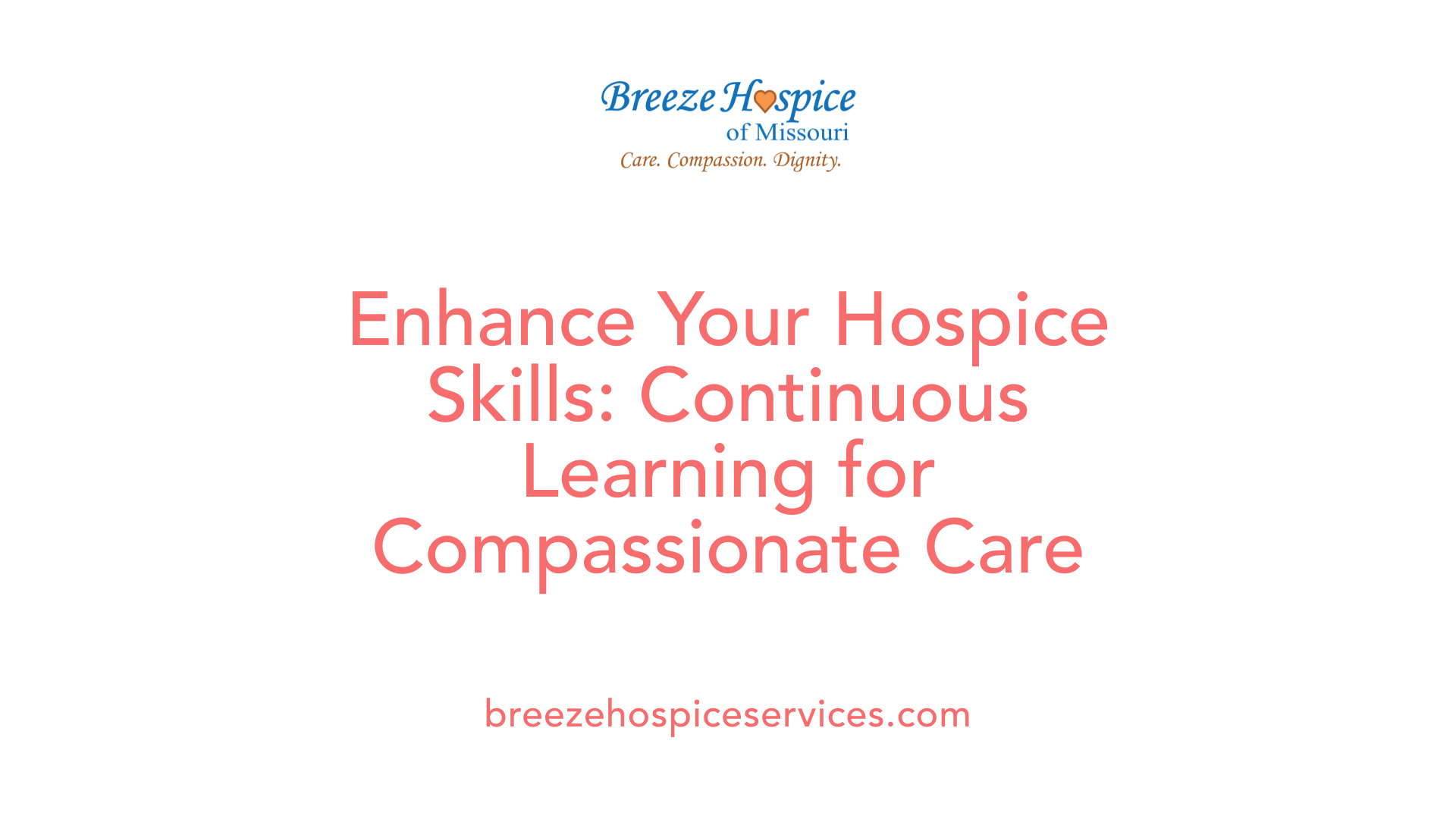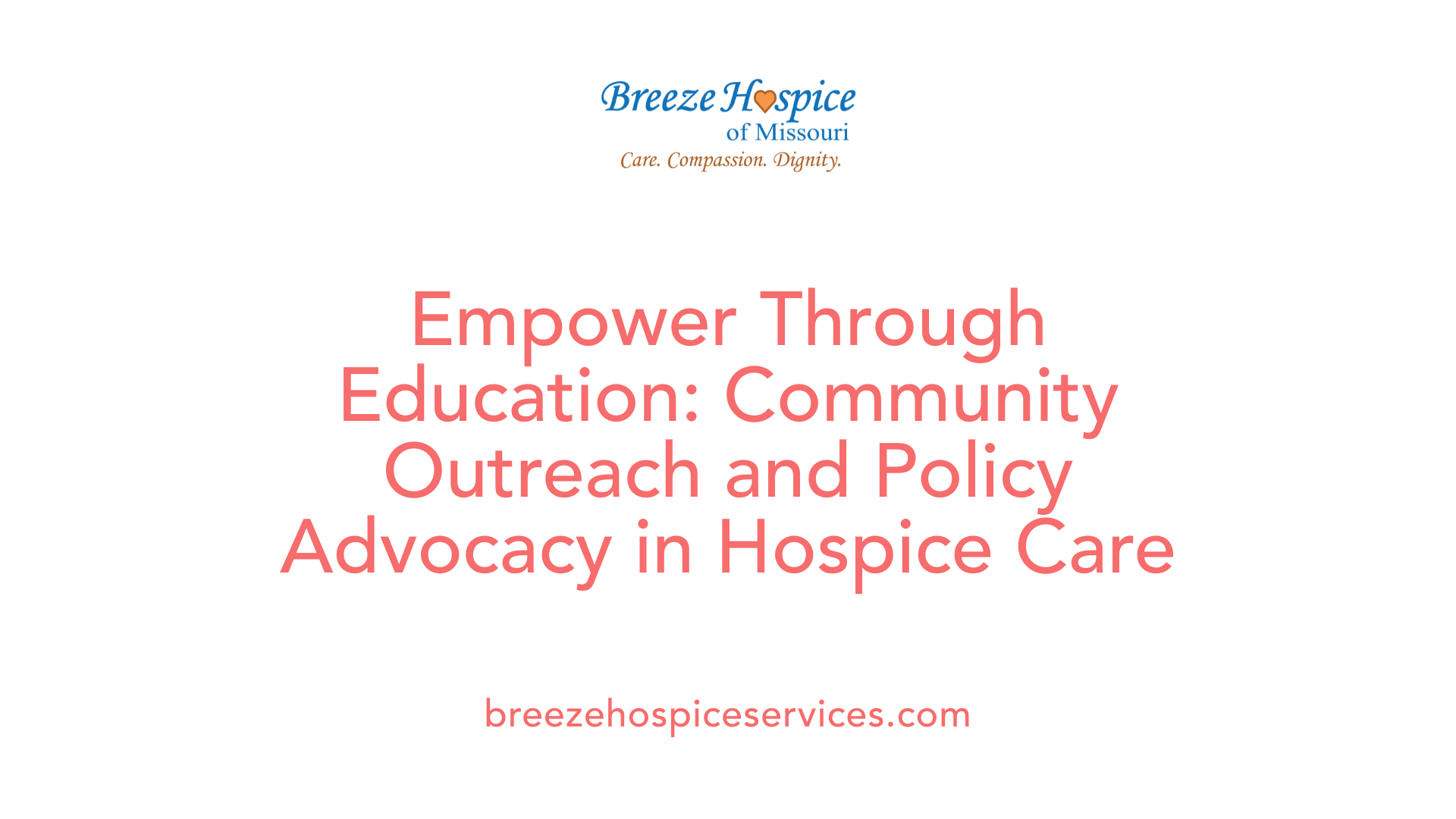Training on Hospice Patient Advocacy
July 25, 2025
Enhancing Compassionate Care Through Targeted Hospice Advocacy Training

Empowering Healthcare Professionals in Hospice Patient Advocacy
Effective hospice patient advocacy requires comprehensive training that equips healthcare providers, social workers, volunteers, and advocates with essential skills and knowledge. This article explores the diverse educational resources, online courses, webinars, and best practices that are shaping the future of hospice care, emphasizing the importance of ongoing professional development and advocacy in ensuring high-quality, patient-centered end-of-life care.
Foundations of Hospice Care Education

Basic principles of hospice care
Hospice care is a medical approach focused on providing comfort and preserving quality of life for patients facing life-limiting illnesses when curative treatments are no longer effective. It emphasizes symptom management, emotional support, and respecting patients' wishes and dignity. Early initiation—preferably months before death—allows patients to benefit fully from hospice services, especially when a patient's health has significantly declined or treatments are not improving quality of life.
Differentiating palliative and hospice care
While often used interchangeably, palliative and hospice care have distinct roles. Palliative care is appropriate at any stage of serious illness and can be provided alongside curative treatments. Hospice care, on the other hand, is specifically for those in the final phase of life, typically when life expectancy is six months or less. Understanding this distinction is important for healthcare professionals in guiding patients and families through their options.
Role of interdisciplinary teams
Effective hospice care relies on a diverse team of healthcare providers—including physicians, nurses, social workers, chaplains, and volunteers—working collaboratively. This interdisciplinary team develops personalized care plans addressing physical symptoms, emotional needs, spiritual concerns, and social support. The team also supports families and caregivers, helping them navigate complex emotional and medical situations.
Bereavement, mourning, and cultural considerations
Hospice care includes support for families both before and after a patient’s death. Services often encompass grief counseling, support groups, and community resources. Cultural and religious beliefs significantly influence how individuals grieve and perceive end-of-life care. Respecting these differences ensures compassionate, personalized support tailored to each family's values and traditions.
What training is needed to work in hospice care?
To work as a hospice aide or similar role, individuals generally need a high school diploma or GED. They must complete specialized training in palliative and end-of-life care, which covers communication, observation, documentation, infection control, emergency recognition, privacy, and hygiene tasks. Certification from organizations like NAHC or NBCHPN, alongside passing a competency evaluation, is often recommended. Most training programs include supervised practical instruction. Minimal prior experience is required; instead, training focuses on core skills essential for patient support. Additional qualifications include background checks, a valid driver’s license, and reliable transportation, as aides typically work in patients' homes.
Are there free online courses or webinars for hospice and palliative care training?
Yes, many free online resources are available to enhance hospice and palliative care knowledge. Professional organizations and educational platforms, such as Relias Learning, offer webinars and courses accessible at no cost. For example, Relias provides free hospice volunteer training modules covering orientation, infection control, safety, and HIPAA compliance. These courses can be enrolled in immediately, allowing for rapid and flexible training. Many institutions, including the Hospice Foundation of America and various professional societies, regularly host free webinars and provide educational tools to support ongoing professional development.
| Resource Provider | Offerings | Audience | Accessibility | Additional Notes |
|---|---|---|---|---|
| Relias Learning | Free hospice volunteer training, compliance modules | Volunteers, staff | Online, on-demand | Covers infection control, safety, HIPAA |
| Hospice Foundation of America | Webinars, factsheets, grief support | Hospice professionals, caregivers | Live and on-demand, free | Includes bereavement and communication topics |
| NAHC & NBCHPN | Certification preparation, specialized courses | Hospice aides, nurses | Online | Includes competency evaluation |
This educational foundation ensures that hospice professionals possess the skills and knowledge necessary to provide compassionate, effective care, reinforcing the importance of continuous learning in this vital field.
Advancing Professional Skills in Palliative and Hospice Care

What are the core principles of hospice care?
Hospice care focuses on providing compassionate support to patients at the end of life. Its main principles include empathy, clear communication, and seamless care coordination. The goal is to honor the patient's dignity and preferences while managing symptoms effectively.
A central aspect of hospice is comfort. This means prioritizing symptom management—such as pain relief and alleviation of distressing symptoms—to improve quality of life. Emphasizing open dialogue, hospice teams encourage honest conversations about diagnosis, treatment options, and patient goals, ensuring everyone involved understands and supports the care plan.
Coordination among healthcare providers, patients, and families ensures that care is personalized and consistent. This approach minimizes conflicts and misunderstandings, creating a respectful and supportive environment where patients feel cared for holistically. Ultimately, hospice principles aim to uphold respect, dignity, and autonomy at the end of life.
What role does a hospice advocate play?
Hospice advocates serve as vital supporters for patients and their families during complex and emotional end-of-life experiences. Their primary role is to ensure that the patient's wishes and needs are prioritized throughout their care journey.
One of their key functions is acting as a voice for those who may be unable to communicate their preferences. Advocates educate themselves on patient rights and the available services, actively participating in medical discussions and decision-making processes.
Beyond individual care, hospice advocates often work to improve access to high-quality hospice and palliative services. They navigate healthcare systems, assist with legal and financial considerations, and provide emotional support. Many also engage in efforts to shape healthcare policies that promote equity and quality in end-of-life care.
In essence, hospice advocates protect the dignity of those they serve by promoting informed choice, ensuring care aligns with patient values, and supporting families through difficult times.
Continuing Education Resources for Hospice Teams
To maintain and advance their skills, hospice professionals have access to specialized training programs. These educational resources cover essential areas such as symptom management, communication about goals of care, and family caregiver support.
Courses are designed to address common symptoms encountered in hospice practice, including nausea, vomiting, dyspnea, constipation, mood disturbances, sleep issues, and pain. Such training ensures clinicians can provide relief effectively and compassionately.
Further specialization includes in-depth modules on pain assessment, treatment matching to different pain types, and safe opioid prescribing practices. These are critical for comprehensive patient care and addressing complex pain management challenges.
In addition to clinical skills, hospice teams are encouraged to participate in webinars and courses on evidence-based advocacy. For instance, the webinar titled 'Evidence-Based Advocacy for the Hospice and Palliative Care Clinician' equips clinicians to promote equitable access and improve care delivery through strategic communication, stakeholder engagement, and data utilization.
This particular program offers 1.0 continuing education credits and is led by expert Billy Rosa, PhD, MBE, APRN, from Memorial Sloan Kettering Cancer Center. It emphasizes advocacy as a fundamental service component, empowering professionals to champion quality care at multiple levels.
Additional Resources and Support
Aside from formal courses, organizations such as the Hospice Foundation of America and Relias provide a range of educational materials—including factsheets, handouts in multiple languages, and training modules. These resources aim to enhance staff competency, support professional development, and foster a culture of continuous improvement.
Furthermore, interdisciplinary webinars and community-based training sessions are freely available online, targeting healthcare providers like paramedics, social workers, nurses, and case managers. Such programs often qualify participants for various professional CE credits.
By integrating these educational initiatives, hospice teams can stay current with emerging best practices, improve symptom management, advocate more effectively, and deliver personalized, respectful end-of-life care.
| Aspect of Training | Course Content | Target Audience | Notes |
|---|---|---|---|
| Symptom Management | Nausea, dyspnea, constipation, mood disturbances, sleep issues, pain | Clinicians, nurses, physicians | Focuses on relief strategies |
| Specialized Pain Care | Pain assessment, matching treatments, opioid prescribing | Healthcare providers involved in pain management | Supports safe, effective pain control |
| Advocacy Skills | Evidence-based advocacy, stakeholder communication, data & narratives | All hospice staff, clinicians | Promotes equitable care access |
| Cultural & Family Support | Bereavement, grieving, cultural sensitivities | Hospice team | Enhances emotional and cultural competence |
Through ongoing education and advocacy efforts, hospice providers are better equipped to deliver compassionate, effective, and equitable care tailored to each patient's needs.
Role of Educational Webinars and Resources
Webinars on evidence-based advocacy methods
A crucial component of hospice education is advocacy, which ensures equitable access to and quality of palliative and hospice care. The webinar titled 'Evidence-Based Advocacy for the Hospice and Palliative Care Clinician' exemplifies this focus. Presented by Billy Rosa, PhD, MBE, APRN, this session guides clinicians on how to utilize data and narrative storytelling to support advocacy efforts.
Participants learn to identify key elements of effective advocacy and develop communication skills to foster relationships with stakeholders. This webinar is designed to strengthen advocacy as a fundamental practice within hospice care, emphasizing the importance of influencing policy and improving care access.
The content delivery includes strategies for integrating evidence into advocacy work, making it a valuable resource for interdisciplinary teams aiming to promote health equity and quality standards.
Building Capacity for Hospice Advocacy and Education

How do community education and outreach efforts enhance hospice care?
Community outreach plays a crucial role in increasing awareness and understanding of hospice and palliative care. Educational resources like factsheets, handouts in multiple languages, and public webinars help demystify end-of-life options and support informed decision-making among diverse populations. Faith Hospice and the Alliance for Care at Home, for example, offer accessible training and informational materials that empower community members and caregivers.
These programs not only inform but also foster trust and engagement with hospice services. By targeting gaps in knowledge, outreach efforts ensure that patients and families recognize the benefits of early hospice care, which ultimately can improve quality of life and facilitate smoother care transitions.
What role does policy advocacy and legislative involvement play in advancing hospice care?
Advocacy at the legislative level ensures that hospice and palliative care are prioritized within healthcare policies and funding. Organizations like the Hospice Foundation of America and the National Alliance for Care at Home actively work to influence legislation, revise clinical guidelines, and promote supportive laws such as PCHETA, which aims to expand research and training in the field.
Efforts also include advocating for equitable access to care, supporting the implementation of existing laws like the Family Health Care Decisions Act and the Palliative Care Information Act, and pushing for reforms that address disparities in end-of-life care. Such advocacy helps secure dedicated funding, develop workforce capacity, and establish standards that promote high-quality hospice services.
What training programs exist for healthcare professionals and volunteers?
Professional education is vital for equipping healthcare teams with the skills needed to deliver compassionate, competent hospice care. Courses offered through platforms like Relias, NAEMT, and the HPNA Learning Center provide training on symptom management, communication about goals of care, ethical decision-making, and cultural competency.
Specialized training modules cover topics including pain assessment, opioid prescribing, management of nausea, dyspnea, and other symptoms, and addressing mental health concerns such as mood and sleep disturbances. Volunteer programs also benefit from training that enhances interaction techniques with patients and families, ensuring supportive and empathetic care.
Many programs offer continuing education credits, certificate programs, and certification review courses that align with regulatory standards and promote professional growth. These initiatives foster a knowledgeable workforce capable of advocating for and providing high-quality hospice services.
| Aspect | Examples | Impact |
|---|---|---|
| Community Outreach | Factsheets; multilingual materials; public webinars | Increased awareness and early engagement |
| Policy Advocacy | Legislation support; guideline revisions; funding advocacy | Improved access and quality standards |
| Professional Training | Symptom management courses; communication skills; volunteer programs | Competent, compassionate care delivery |
Building capacity in hospice advocacy and education requires a collaborative approach involving community members, policymakers, and healthcare professionals. This integrated effort helps ensure that hospice care remains accessible, effective, and aligned with best practices for supporting patients and families at the end of life.
Strengthening the Workforce for Compassionate End-of-Life Care
Ensuring that healthcare professionals, volunteers, and advocates are well-equipped with knowledge and skills is vital for delivering compassionate, patient-centered hospice care. A broad array of educational resources—from free webinars and online courses to specialized certifications—facilitates continuous professional development. By fostering an informed workforce dedicated to advocating effectively for patients, hospice organizations can promote equitable access, uphold patient rights, and improve the quality of end-of-life care across diverse settings.
References
- Hospice Care Teams | Continuing Education | Learning Pathway
- Hospice & Palliative Care Online Continuing Education | MJHS ...
- Hospice Foundation of America: Home
- Advocacy - National Coalition for Hospice and Palliative Care
- Hospice and Palliative Care Training & Solutions - Relias
- Hospice and Palliative Care - NAEMT
- Hospice & Palliative Care Online Continuing Education
- Education - National Alliance for Care at Home



































































































